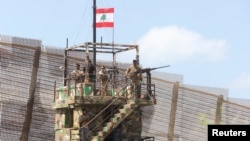The Israeli military withdrawal from Lebanon’s southern town of Naqoura is the second pullout since the November ceasefire agreement, analysts say. Israel is to withdraw from southern Lebanon over a 60-day period, while Lebanon’s Shiite militia Hezbollah is to retreat some 30 kilometers north from the border with Israel and dismantle its military infrastructure in the south.
Filippo Dionigi, a specialist on Lebanon at Britain’s University of Bristol, told VOA there have been violations by both sides in this fragile truce.
“There was a 60-days deadline for Israel to move out of Lebanese territory and for the Lebanese army to take over control of those areas that were previously occupied by Israel. This has not happened yet for the greatest majority of the villages,” Dionigi said.
“There are 60 [villages] that are still occupied and only 3 of them have been actually evacuated by Israeli forces. On the other hand, Hezbollah has made several declarations that it reserves the right to act against Israel.”
The ceasefire, brokered in part by U.S. envoy Amos Hochstein, sees the Lebanese army deploying alongside United Nations peacekeepers. Hochstein told Lebanese leaders this week in Beirut that all Israeli troops will leave.
“The Israeli military started its withdrawal from Naqoura, most of the western sector, and back into Israel proper. These withdrawals will continue until all Israeli forces are out of Lebanon completely. And as the Lebanese army continues to deploy in the south and all the way to the Blue Line,” Hochstein said.
The 120-kilometer Blue Line is a U.N. demarcation line dividing Lebanon from Israel and the Golan Heights, but it is not an official international border.
Analyst Dania Koleilat Khatib, president of the Research Center for Cooperation and Peace Building in Beirut, told VOA it is necessary for Israel to withdraw fully, which also will keep Hezbollah in check.
“You should not give any excuses to Hezbollah. As long as there is a problem, it will help Hezbollah rebuild its base,” she said.
However, published reports in Israel say Israeli officials are pushing to keep some troops in southern Lebanon longer than stipulated by the ceasefire agreement.
Nicholas Heras of the Washington-based New Lines Institute suggested to VOA that there may be a caveat on the ceasefire deal.
“It’s very clear that the Israelis only agreed to it because the Israeli understanding is that they would have freedom of action at any point if they perceived there to be the reemergence of Hezbollah south of the Litani River, or if they felt the Lebanese army was insufficiently present south of the Litani River,” Heras said.
The Litani River is situated about 30 kilometers north of the border with Israel. Heras said that from Israel’s perspective “it’s not withdrawing its ability to act in Lebanon. It’s essentially reconsolidating its forces out of Lebanon with the posture to be able to engage in Lebanon at any point in time.”
Meanwhile, analysts say it’s unclear whether Lebanon’s parliament will succeed in electing a new president Thursday, which past sessions have failed to do for more than two years amid bitter divisions between Hezbollah and its opponents. Hochstein urged political consensus to break the deadlock.
His push is part of calls by both the outgoing and incoming U.S. administrations to end the fighting in Lebanon and Gaza quickly.
In Gaza, Hamas leaders said they cleared a list of 34 hostages to go free in the first stage under a truce, while U.S. President-elect Donald Trump on Tuesday vowed there would be “hell to pay” if hostages are not freed before his inauguration on Jan. 20.




